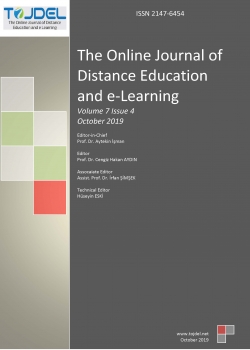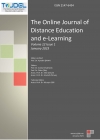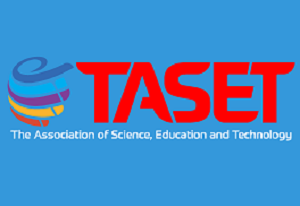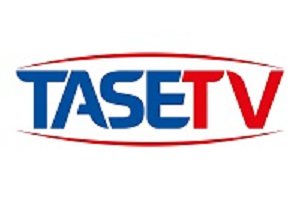TOJDEL - Volume 7 - Issue 4 - October 2019
 AN ACTION RESEARCH OF O2O BLENDED LEARNING IN THE INTEGRATED ENGLISH CLASS UNDER THE CONTEXT OF A CHINESE PRIVATE LANGUAGE UNIVERSITY
AN ACTION RESEARCH OF O2O BLENDED LEARNING IN THE INTEGRATED ENGLISH CLASS UNDER THE CONTEXT OF A CHINESE PRIVATE LANGUAGE UNIVERSITY Ling Li
Abstract:
Based on the framework of action learning, this study attempted to construct an online-to-offline (O2O) blended class of integrated English based on the flipped classroom, focusing on cultivating students' listening and speaking capability and critical thinking ability, improving students' competence to analyze and solve problems using English, and giving full play to students' personality characteristics. This action research spanned from February 2019 to June 2019. Taking the 130 students of integrated English class of College of International Business (CIB) of Zhejiang Yuexiu Foreign Languages University (ZYUFL) as samples, this paper adopted qualitative research methods, through the analysis of log observation and reflection reports, combining with comparisons of the quantitative online data. This paper drew the conclusion that the O2O blended learning based on flipped classroom in the integrated English class was the practice of innovative teaching mode and it created interactive classes of integrated English. It is suggested that if implemented from the beginning of freshman year, the continuation effect of this teaching mode should be better. In addition, if more teacher training opportunities were available, and if the teaching facilities and environment could be improved, the effect of this teaching mode should be more significant.
 AN INVESTIGATION ON THE ROLE OF PERCEIVED EASE OF USE, PERCEIVED USE AND SELF EFFICACY IN DETERMINING CONTINUOUS USAGE INTENTION TOWARDS AN E-LEARNING SYSTEM 267
AN INVESTIGATION ON THE ROLE OF PERCEIVED EASE OF USE, PERCEIVED USE AND SELF EFFICACY IN DETERMINING CONTINUOUS USAGE INTENTION TOWARDS AN E-LEARNING SYSTEM 267 Thiruchelvi Arunachalam
Abstract:
There is a paradigm shift in the way organisations impart training and development to its employees with the advent of e-learning system. The study aimed to understand the role of perceived ease of use, perceived use and self efficacy in determining the continuous usage of an e-learning system among employees of software companies. The study also tried to understand the mediating role of learner satisfaction and the moderating role of gender in the relationship between perceived ease of use, perceived use and continuous usage intention. The data was collecyed from 250 employees in the Information Technology Industry, who had done atleast a course in the e-learning platform. The results show that the relation between perceived usefulness and behavioural intention, perceived ease of use and behavioural intention and self efficacy and behavioural intention are all mediated by e-learner satisfaction. This implies e-learner satisfaction has to be enhanced if the continuous usage intention is to be improved.
 ONLINE LEARNING READINESS: PERSPECTIVE OF STUDENTS ENROLLED IN DISTANCE EDUCATION IN GHANA
ONLINE LEARNING READINESS: PERSPECTIVE OF STUDENTS ENROLLED IN DISTANCE EDUCATION IN GHANA Ishmael K. Forson, Essi Vuopala
Abstract:
Significance of online learning is widely recognized as a means to enhance accessibility and quality of teaching-learning process in the world. In Ghana, there is a trend to broaden the use of online learning through the distance education programme. However, issues of student readiness for online learning at the distance education mode has been left unattended to. Therefore, the current paper has its objective to explore readiness of distance education students for online learning. Descriptive research design was employed for the study. A multistage sampling procedure was used to select three regions in Ghana and six study centers from the regions out of which 306 first year students enrolled in distance education programme in the University of Cape Coast participated in the study. A five-point Likert type of questionnaire was used for the data collection. Data was analyzed by using descriptive statistics specifically mean and standard deviation as well as inferential statistics thus independent sample t-test and standard multiple linear regression. Findings from the study suggest that distance education students had a positive attitude towards online learning. Further, it was also revealed that students possessed good self-regulated learning, collaborative and information communication and technology skills relevant for online learning through the distance education mode. Management of Universities running distance education specifically the university of Cape Coast, College of Distance Education (CoDE) should direct their focus to the formulation of appropriate and operational distance education policies to guide the college towards successful implementation of online learning since their target audience (students) have positive attitude toward online learning.
 PREDICTING EASE OF STUDYING AND LEARNING SUCCESS FROM LEARNER CHARACTERISTICS IN A DISTANCE TRAINING FOR IN-SERVICE TEACHERS
PREDICTING EASE OF STUDYING AND LEARNING SUCCESS FROM LEARNER CHARACTERISTICS IN A DISTANCE TRAINING FOR IN-SERVICE TEACHERS Klaus D. STILLER, Regine BACHMAIER
Abstract:
How to support students in successful learning is one of the persisting problems of distance and online learning. One research focus that can inform educators is to explore the extent that learners’ characteristics and skills determine learning. Thus, this study explores the effects of domain-specific prior-knowledge, intrinsic motivation, computer attitude, computer anxiety, and learning management skills on learning in a training course about media pedagogy for teachers. The data were collected from 49 in-service teachers who answered various questionnaires and took knowledge tests. By using regression analyses, we investigated the extent that the selected learner characteristics account for ratings of content difficulty, studying difficulty, experienced pressure/tension, and effort/importance while learning and for performance. Content difficulty was best predicted by computer anxiety and studying difficulty by computer anxiety and intrinsic motivation. The experienced pressure/tension was best predicted by intrinsic motivation and time management skills. Effort/importance was best predicted by meta-cognitive skills and performance by meta-cognitive skills and prior knowledge.
 SOCIAL NETWORKING AS AN E-LEARNING TOOL FOR GAINING TECHNOLOGY RESOURCES USING GENETIC ALGORITHM
SOCIAL NETWORKING AS AN E-LEARNING TOOL FOR GAINING TECHNOLOGY RESOURCES USING GENETIC ALGORITHM O.Pandithurai, M.Geetha, P.Deepika
Abstract:
Social networking is used widely by all the users for sharing their knowledge. Face book, Twitter, LinkedIn are the very commonly used social networking applications. used social media. The students have various groups in these social networking applications for sharing the knowledge related to their domains. Since most of the time, the students spend their time on social media, it has become very vibrant to aggregate the resources related to the education. In this paper, we have highlighted the abundant use of social networking to improve the learning through e-platform. This paper explores the role of Social Networking Sites (SNS) in e-learning by investigating the attitudes, behaviors, knowledge and views of computing students towards the use of SNS in e-learning. Online social networks (OSNs) have gained popularity among users from all over the world during the past few years. And E-learning has made learning process quite convenient for users by using the networks. Data was collected from an online survey and interviews, and analyzed to discover the practices, tendencies and the current status of the use of SNS in e-learning as well as how these can be improved. By combinning OSNs with E-learning is a new idea. And the role of OSNs in students' E-learning experiences is focused on in this paper. And it is believed that online social networks can be effectively used in E-learning in the future. We believe that SNS can play a major supporting role in e-learning and that the potential for using SNS in e-learning is not fully reached. The situation may be improved by providing increased guidance and training to students. Learning activities using SNS should be planned and organized. Brief guidelines on using SNS in e-learning are also included in this paper.
 THE COMPLEXITIES OF DISTANCE EDUCATION, ONLINE LEARNING AND USE OF TECHNOLOGY IN LEARNER SUPPORT SERVICES
THE COMPLEXITIES OF DISTANCE EDUCATION, ONLINE LEARNING AND USE OF TECHNOLOGY IN LEARNER SUPPORT SERVICES Anne Achieng Aseey
Abstract:
This article examines the complexities of Distance Education, online learning and Use of Technology in Learner Support Service in higher education in Kenya. Learning at higher education has gone though several changes since the invention of new technologies which can be used to enhance teaching and learning. In the field of education in both developed and developing countries, the impact of technology is being felt from the learners, teachers and community perspective. Distance education which has been used for ages in various higher institutions of learning changed a lot in its mode of delivery because of the use of various technologies. Since then, institutions have embarked on online learning which uses technology more. The paper tries to identify varies type of support services which are offered by distance learning and how technology has created an impact on the services and how the education provides view technology in education. Tutorials and pedagogy are some of the key support services in the distance learning programmes. The findings of the study also indicated that lecturers were ready to adopt and use technology in course delivery as it is capable of improving the quality of teaching by distance and in online platform and also is capable of improving their interaction with the learners. The major conclusions of the study was that technology if fully integrated in the teaching and learning process, will have benefits in access to education, cost reduction, improved syllabus coverage and good leaner and tutor interaction amongst others.
 VIRTUAL REFERENCE SERVICE TOOLS AND APPS: FEATURES OF LIBANSWERS AND TAWK.TO
VIRTUAL REFERENCE SERVICE TOOLS AND APPS: FEATURES OF LIBANSWERS AND TAWK.TO Atasi Sinhababu, Shiv Kumar
Abstract:
Like any other software type, the Virtual Reference Service (VRS) solutions or applications can be classified as proprietary and free, free being very few meeting the VRS requirements comprehensively. Among the proprietary Software Altarama, Mosio for libraries, LibraryH3lp, LibAnswers etc. are more popular with wider adoption. They all facilitate chat, IM, SMS and web form based communications, with a few offering additional features like professional backup staff and consortia-ready. They intend to provide a complete and integrated reference management system for users support and assistance. Free tools do not over run integrated approach but a library may choose a combination of several free tools or apps for implementing VRS. The paper discusses the features of LibAnswers (paid) and tawk.to as the free VRS tools which may enables the libraries to initiate VRS without any financial implications.
 WORK STRESS, WORK ENGAGEMENT AND SERVICE DELIVERY WITHIN A CHANGING DISTANCE- LEARNING ENVIRONMENT IN ZIMBABWE
WORK STRESS, WORK ENGAGEMENT AND SERVICE DELIVERY WITHIN A CHANGING DISTANCE- LEARNING ENVIRONMENT IN ZIMBABWE Dominic UZHENYU
Abstract:
This research was conducted from the perspective of a positive human behaviour paradigm in the context of human resource management. It investigated the interrelationships between work stress, work engagement and service delivery of academics in a changing distance-learning environment in Zimbabwe, for which there is a paucity of research. A descriptive, cross-sectional survey design was applied to a sample of 83 academics. Another sample of 101 students was included to consider their perception of service delivery by academics. Confirmatory and exploratory analysis revealed a four-construct measurement model for work stress, a three-construct model for work engagement and a four-construct model for service delivery. Correlational analysis and structural equation modelling revealed significant relationships between these constructs. Tests for significant differences among different groups based on socio-demographic variables were revealed. The t-test did not reveal significant differences in service delivery perceptions between academics and students. This study should bring new knowledge to managers at distance- learning universities by improving their understanding of how academics are affected by increasing, new job demands and workloads. Provision of adequate resources at both individual and organisational levels should be prioritised in order to minimise work stress and improve work engagement, and subsequently service delivery.






